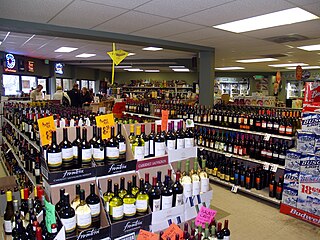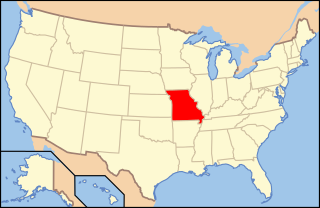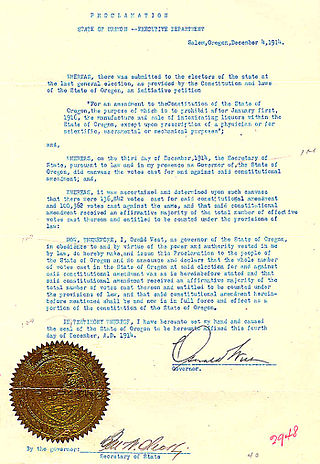
Prohibition is the act or practice of forbidding something by law; more particularly the term refers to the banning of the manufacture, storage, transportation, sale, possession, and consumption of alcoholic beverages. The word is also used to refer to a period of time during which such bans are enforced.

A bar, also known as a saloon, a tavern or tippling house, or sometimes as a pub or club, is a retail business establishment that serves alcoholic beverages, such as beer, wine, liquor, cocktails, and other beverages such as mineral water and soft drinks. Bars often also sell snack foods, such as crisps or peanuts, for consumption on their premises. Some types of bars, such as pubs, may also serve food from a restaurant menu. The term "bar" refers to the countertop where drinks are prepared and served, and by extension to the overall premises.
In a bar, a last call is an announcement made shortly before the bar closes for the night, informing patrons of their last chance to buy alcoholic beverages. There are various means to make the signal, like ringing a bell, flashing the lights, or announcing verbally.

A liquor store is a retail business that predominantly sells prepackaged liquors, wine or beer, usually intended to be consumed off the store's premises. Depending on region and local idiom, they may also be called an off-licence, off-sale, bottle shop, bottle store or, colloquially, bottle-o, liquor store or other similar terms. A very limited number of jurisdictions have an alcohol monopoly. In US states that are alcoholic beverage control (ABC) states, the term ABC store may be used.
Alcoholic beverage control states, generally called control states, less often ABC states, are 17 states in the United States that have state monopoly over the wholesaling or retailing of some or all categories of alcoholic beverages, such as beer, wine, and distilled spirits.
The Washington State Liquor and Cannabis Board, formerly the Washington State Liquor Control Board, is an administrative agency of the State of Washington. The Liquor and Cannabis Board is part of the executive branch and reports to the Governor. The board's primary function is the licensing of on and off premises establishments which sell any type of alcohol, and the enforcement and education of the state's alcohol, tobacco, and cannabis laws.

Oklahoma allows any establishment with a beer and wine license to sell beer and wine up to 15% ABV, under refrigeration.

The alcohol laws of Missouri are among the most permissive in the United States. Missouri is known throughout the Midwest for its largely laissez-faire approach to alcohol regulation, in sharp contrast to the very strict alcohol laws of some of its neighbors, like Kansas and Oklahoma.

The alcohol laws of Kansas are among the strictest in the United States, in sharp contrast to its neighboring state of Missouri, and similar to its other neighboring state of Oklahoma. Legislation is enforced by the Kansas Division of Alcoholic Beverage Control.

Alcohol laws of New York are a set of laws specific to manufacturing, purchasing, serving, selling, and consuming alcohol in the state of New York. Combined with federal and local laws, as well as vendor policies, alcohol laws of New York determine the state's legal drinking age, the driving under the influence limit, liquor license requirements, server training, and more.

The alcohol laws of Pennsylvania contain many peculiarities not found in other states, and are considered some of the strictest regulations in the United States.
Alcohol laws of West Virginia are more complex on paper than in actual practice, owing to a provision of the state constitution and "work-arounds" of its terms.
Alcohol laws of Maryland vary considerably by county, due to the wide latitude of home rule granted to Maryland counties.

The U.S. state of Oregon has an extensive history of laws regulating the sale and consumption of alcoholic beverages, dating back to 1844. It has been an alcoholic beverage control state, with the Oregon Liquor and Cannabis Commission holding a monopoly over the sale of all distilled beverages, since Prohibition. Today, there are thriving industries producing beer, wine, and liquor in the state. Alcohol may be purchased between 7 a.m. and 2:30 a.m for consumption at the premise it was sold at, or between 6 a.m. and 2:30 a.m. if it is bought and taken off premise. In 2020, Oregon began allowing the sale of alcohol via home delivery services. As of 2007, consumption of spirits was on the rise while beer consumption held steady. That same year, 11% of beer sold in Oregon was brewed in-state, the highest figure in the United States.

Alcohol laws are laws relating to manufacture, use, being under the influence of and sale of alcohol or alcoholic beverages. Common alcoholic beverages include beer, wine, (hard) cider, and distilled spirits. Definition of alcoholic beverage varies internationally, e.g., the United States defines an alcoholic beverage as "any beverage in liquid form which contains not less than one-half of one percent of alcohol by volume". Alcohol laws can restrict those who can produce alcohol, those who can buy it, when one can buy it, labelling and advertising, the types of alcoholic beverage that can be sold, where one can consume it, what activities are prohibited while intoxicated, and where one can buy it. In some cases, laws have even prohibited the use and sale of alcohol entirely.
The alcohol laws of Wisconsin consist of both statewide statutes and local ordinances governing the sale of alcohol.
Blue laws, also known as Sunday laws, are laws that restrict or ban some or all activities on specified days, particularly to promote the observance of a day of rest. Such laws may restrict shopping or ban sale of certain items on specific days. Blue laws are enforced in parts of the United States and Canada as well as some European countries, particularly in Austria, Germany, Switzerland, and Norway, keeping most stores closed on Sundays.
The alcohol laws of Maine regulate the sale and possession of alcohol in the state of Maine in the United States. Maine is an alcoholic beverage control state.

A person must be at least 15-17 years of age to publicly drink an alcoholic beverage in Texas, with some exceptions










